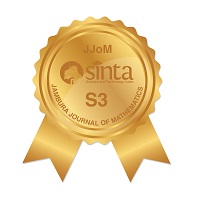Modeling and Control of the Extreme Ideology Transmission Dynamics in a Society
Abstract
Keywords
Full Text:
PDFReferences
K. Hardy, "Comparing Theories of Radicalisation with Countering Violent Extremism Policy" Journal for Deradicalization, vol. Summer, no. 15, pp. 76-110, 2018.
C. Connell McCluskey and M. Santoprete, "A bare-bones mathematical model of radicalization" Journal of Dynamics & Games, vol. 5, no. 3, pp. 243-264, 2018, doi: 10.3934/jdg.2018016. [Online]. Available: http://aimsciences.org//article/doi/10.3934/jdg.2018016
M. Santoprete and F. Xu, "Global stability in a mathematical model of de-radicalization" Physica A: Statistical Mechanics and its Applications, vol. 509, pp. 151-161, nov 2018, doi:10.1016/j.physa.2018.06.027. [Online]. Available:https://linkinghub.elsevier.com/retrieve/pii/S0378437118307519
L. Huo, T. Lin, C. Fan, C. Liu, and J. Zhao, "Optimal control of a rumor propagation model with latent period in emergency event" Advances in Difference Equations, vol.2015, no. 1, p. 54, dec 2015, doi: 10.1186/s13662-015-0394-x. [Online]. Available: http://www.advancesindifferenceequations.com/content/2015/1/54
L. Huo and C. Ma, "Optimal Control of Rumor Spreading Model with Consideration of Psychological Factors and Time Delay" Discrete Dynamics in Nature and Society, vol. 2018, pp. 1-12, jul 2018, doi: 10.1155/2018/9314907. [Online]. Available: https://www.hindawi.com/journals/ddns/2018/9314907/
F. Jin, E. Dougherty, P. Saraf, Y. Cao, and N. Ramakrishnan, "Epidemiological modeling of news and rumors on Twitter" in Proceedings of the 7th Workshop on Social Network Mining and Analysis - SNAKDD '13. New York, New York, USA: ACM Press, 2013. ISBN 9781450323307 pp. 1-9, doi: 10.1145/2501025.2501027 [Online]. Available:http://dl.acm.org/citation.cfm?doid=2501025.2501027
D. Aldila, N. Nuraini, and E. Soewono, "Mathematical model for the spread of extreme ideology" in AIP Conference Proceedings, 2015, pp. 33-39, doi: 10.1063/1.4914429. [Online]. Available: http://aip.scitation.org/doi/abs/10.1063/1.4914429
A. Goyal, J. Shukla, A. Misra, and A. Shukla, "Modeling the role of government efforts in controlling extremism in a society" Mathematical Methods in the Applied Sciences, vol. 38, no. 17, pp. 4300-4316, nov 2015, doi: 10.1002/mma.3368. [Online]. Available: https://onlinelibrary.wiley.com/doi/10.1002/mma.3368
D. O. Aluoch, S. Osman, and M. Wainaina, "Mathematical Modelling of Extremism with Sensitixation effects in Kenya" Global Journal of Pure and Applied Mathematics, vol. 15, no. 5, pp. 711-731, 2019.
L. Clutterbuck, "Deradicalization Programs and Counterterrorism: A Perspective on the Challenges and Benefits" 2015. [Online]. Available: https://www.mei.edu/publications/deradicalization-programs-and-counterterrorism-perspective-challenges-and-benefits (Accessed 2022-01-14).
C. Mastroe and S. Szmania, "Surveying CVE Metrics in Prevention , Disengagement and Deradicalization Programs" University of Maryland, Tech. Rep. March, 2016.
M. Santoprete, "Countering violent extremism: A mathematical model" Applied Mathematics and Computation, vol. 358, pp. 314-329, oct 2019, doi: 10.1016/j.amc.2019.04.054. [Online]. Available: https://linkinghub.elsevier.com/retrieve/pii/S009630031930342X
P. van den Driessche and J. Watmough, "Reproduction numbers and sub-threshold endemic equilibria for compartmental models of disease transmission" Mathematical Biosciences, vol. 180, no. 1-2, pp. 29-48, nov 2002, doi: 10.1016/S0025-5564(02)00108-6. [Online]. Available:https://linkinghub.elsevier.com/retrieve/pii/S0025556402001086
L. Edelstein-Keshet, Mathematical Models in Biology. New York: Society for Industrial and Applied Mathematics, jan 2005. ISBN 978-0-89871-554-5 Doi: 10.1137/1.9780898719147. [Online]. Available:http://epubs.siam.org/doi/book/10.1137/1.9780898719147
S. Naidu and R. C. Dorf, Optimal Control Systems (Electrical Engineering Series), 1st ed. Florida: CRC Press, 2002.
DOI: https://doi.org/10.34312/jjom.v5i1.15583
Copyright (c) 2023 Nur Azizah, Toni Bakhtiar, Paian Sianturi

This work is licensed under a Creative Commons Attribution-NonCommercial 4.0 International License.
Jambura Journal of Mathematics has been indexed by
Jambura Journal of Mathematics (e-ISSN: 2656-1344) by Department of Mathematics Universitas Negeri Gorontalo is licensed under a Creative Commons Attribution-NonCommercial 4.0 International License. Powered by Public Knowledge Project OJS.
Editorial Office
Department of Mathematics, Faculty of Mathematics and Natural Science, Universitas Negeri Gorontalo
Jl. Prof. Dr. Ing. B. J. Habibie, Moutong, Tilongkabila, Kabupaten Bone Bolango, Gorontalo, Indonesia
Email: [email protected].



















